The Georgia Department of Corrections’ top health official says he is personally overseeing a plan he hopes will restore sanitary conditions to the state’s prison hospital.
In his first public comments on the ongoing controversies at Augusta State Medical Prison, Randy Sauls, the GDC’s assistant commissioner of health services, said he has a plan that includes more than a dozen action items. In an effort to see them through, he said he is spending one day a week at the facility.
“We’re a proud agency, and we’re not happy with what happened, so we’re going to fix it,” he told The Atlanta Journal-Constitution.
Augusta State Medical Prison, the flagship of Georgia's correctional medical system, has faced questions following AJC stories last year that revealed environmental and security issues that had persisted for months and in some cases even years.
The issues included leaking ceilings, leading to the growth of so-called black mold; broken toilets and showers in the dormitories where inmates recover after surgeries; trash stored outside the operating room attracting flies and mosquitoes; and security breaches that caused nurses to quit in fear for their lives.
The stories prompted the Department of Corrections last November to reassign warden Ted Wilkes after 18 months in the position. In December, the hospital administrator, Randy Brown, was forced to retire after his employer, Georgia Correctional HealthCare, determined that he had secretly recorded his conversations with other corrections officials.
Over the weekend, the AJC reported that one of the facility's most experienced physicians, Dr. Timothy Young, is resigning as medical director of the outpatient clinic. In his letter of resignation, Young cited concerns for his own health and safety as well as "extreme dysfunction" in the way healthcare is administered in the state prison system.
Sauls didn’t address healthcare delivery, which is the responsibility of Georgia Correctional HealthCare. But he said he is confident that the Department of Corrections is on a path to correcting many of the problems that have plagued the 34-year-old Grovetown facility.
“I’m excited about where we are,” he said. “Issues have been identified, we’ve got a corrective action plan and we’re moving forward.”
Sauls said it’s too early to put a pricetag on the project because there are so many different elements, but he called it “a good investment for us.”
Sauls, who was hired for his position in August 2016 after 25 years in private healthcare administration, noted that ASMP presents unusual challenges because it is both a large, closed security prison and a hospital with 55 beds and other clinical areas. However, that doesn’t mean it can be treated any differently than a more conventional hospital, he said.
“That’s a Georgia hospital and we need to maintain it just like the community hospital down the street,” he said.
Sauls said the GDC has already solicited bids for a company to provide a terminal cleaning. He said he hopes the work — essentially a deep, disinfecting cleaning of the facility — can begin late next month.
According to Sauls, ASMP has undergone such cleanings before, “but obviously we’ve missed the mark a little bit.”
Another priority, Sauls said, is hiring a director of environmental services. The position will be filled by somebody trained to work in a prison hospital environment and who can oversee future efforts to maintain proper sanitation, he said.
Asked about the leaking ceilings and problems stemming from them, Sauls said a project is underway to repair expansion joints in the roof that have been identified as the source of the leaks.
“That will remedy the roof leaks, and any ongoing moisture concerns will be remedied because of that,” he said.
Sauls also said the maintenance system has been changed so that work orders are prepared electronically instead of just on paper, allowing for speedier and more efficient repairs when property is damaged.
Although Sauls’ list deals almost exclusively with maintenance and environmental matters, he said security is being improved as well, mainly through underscoring the need to accommodate the facility’s medical personnel.
“It’s more of an educational process, having security understand that this is a different mission,” he said. “The warden has repurposed them and re-educated them about that mission. If a room needs to be cleaned by 5 o’clock, security needs to facilitate that.”
Sauls said he has been going to ASMP every Wednesday since December. He will stay on that schedule until he feels comfortable, he said.
“I want us to get to a fresh starting point where we have ongoing maintenance, where our eye’s on the ball and we’re moving forward,” he said. “Hopefully, with new leadership, we will continue moving forward and not get to this point again.”
About the Author
Keep Reading
The Latest
Featured



